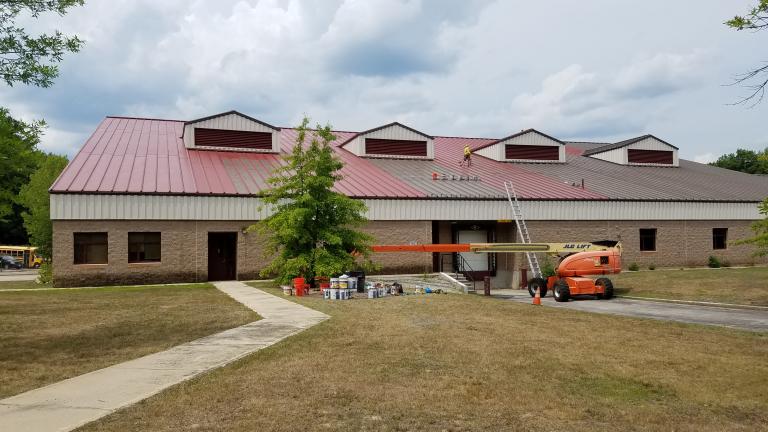How on-demand construction contracts compare to traditional procurement
On-demand construction contracts — including Job Order Contracting (JOC) — allow you to manage all types of construction projects through a single, competitively solicited contract. You can choose from local, awarded contractors who understand your region’s building requirements and use pre-set, transparent pricing.
And it works: Industry research shows IDIQ projects are more likely to be delivered on time, on budget, and with higher satisfaction than traditional construction methods. (Source: Job Order Contracting Performance: 2016 Industry Survey)
Common project types include:
• Infrastructure upgrades and capital construction
• Facility renovations and routine maintenance
• Emergency and time-sensitive repairs
• Projects requiring region-specific pricing and local contractor expertise
• Multiphase projects that benefit from consistent, end-to-end support
Make your next project easier to manage

State of Georgia
Are you are interested in IDIQ, and a part of a state agency, municipality, city, township, or county within the State of Georgia? The Georgia Department of Administrative Services (DOAS) holds a Statewide Contract (SWC).
Why choose Sourcewell?
Common Questions
IDIQ is based on reputation and relationships. The owner is not obligated to give the contractor more work. This motivates the contractor to meet and exceed expectations with quality work, completed on time. The Job Order Contracting Performance: 2016 Industry Survey by the Performance Based Studies Research Group at Arizona State University found that 96% of Job Order Contracting projects were rated satisfactory by respondents. Almost all (99%) owner participants said they would recommend Job Order Contracting.
These high marks derive from the time and cost saving benefits of Job Order Contracting processes, as well as greater transparency, flexibility, and efficiency than other procurement methods. Owners were 60% more satisfied with the Job Order Contracting process compared to design-bid-build or design-build.
Budgetary control and cost savings are a cornerstone of IDIQ enhanced Job Order Contracting. In fact, a JOC industry survey reports 91% of projects were delivered on budget.
Owners also estimated a 24% savings in administrative costs, while contractors estimated a 21% overall cost savings. Owners claim cost savings from decreased procurement administration, less project manager support, and lower design costs. Procuring projects cost less because the owner does not have to repeat the entire procurement cycle. The cost of construction is firm by the preset unit prices in the Construction Task Catalog, which prices over 275,000 work tasks.
The awarded contractor has competitively solicited an adjustment factor to the pre-established unit prices. This provides the owner a competitive price for each element of the project Scope of Work. And, because contractors are soliciting a series of projects instead of each small project, they may offer a volume discount.
The traditional design-bid-build cycle typically takes months to complete and uses significant administrative and technical resources. You can now immediately access local contractors through a competitively solicited contract with Sourcewell. There is no need for preparing, copying, advertising, and distributing solicitation packages for each project.
The procurement process takes weeks instead of months:
Small Projects - 5-10 Working Days
- Day 1-2: Joint Scope Meeting
- Day 3-4: Prep Scope Issue RFP
- Day 5-6: Contractor Prepares Proposal
- Day 7-8: Review Proposal
- Day 9-10: Issue PO
Larger Projects - 30 Working Days
- Week 1: Joint Scope Meeting
- Week 2-3: Prep Scope Issue RFP and Contractor Prepares Proposal
- Week 3-4: Contractor Finalizes Proposal and Review Begins
- Week 4: Complete Proposal Review and Issue PO
The CTC accesses data from a Construction Cost Database of over 275,000 tasks with associated costs for all areas of construction. Each task contains a detailed description, unit of measurement, and unit price. The labor, material, and equipment price components reflect local prices, prevailing wages, and working conditions at the time of publishing. There are a set of Technical Specifications for each of the construction tasks and general conditions that contain the specific contract language concerning the execution of the contract.
Change orders are greatly reduced because the contractor participates in the Joint Scope Meeting with the owner and field personnel. This up front, open communication eliminates the misunderstandings that lead to most change orders. The owner has the right to change the Scope of Work at any time during the project.
Extra work and changes are priced using the preset unit prices in the Construction Task Catalog for the owner’s specific area. The contractor is motivated to be efficient and effective without sacrificing quality or customer satisfaction. Ultimately, the contractor’s performance dictates the opportunity for future work.
Local, minority/women owned businesses and residency initiatives can be handled on a project-by-project or program-wide basis. The owner has the right to approve all subcontractors prior to issuance of the purchase order. Any specific conditions of the project, such as bonding or special insurance, is specified in the purchase order.
The adjustment factors are modified on the anniversary date of the contract award, based on the Construction Cost Index (CCI) in the Engineering News-Record. The average CCI for the current year is divided by the average CCI for the base year and equals the increase or decrease in the construction costs. The percentage is multiplied by the original adjustment factor and thus equals the adjustment factor for the next 12 months.
Most of the time you don’t. The contractor is the single point of contact for construction schedule and quality. Many agencies use the services of an architect to prepare contract documents for procurement purposes, however this has already been completed by awarded IDIQ contracts.
Projects with a more complex scope of work may require engineering and architectural services to define the scope of work or for permitting. If such services are required and the agency prefers, the contractor will obtain these services.
Awarded contracts simplify and expedite the construction procurement process, so work can begin earlier. They also put the owner in contractual control and dramatically increase the quality of work. Owners have access to professional construction contractors, working under a competitively solicited contract.
Sourcewell-awarded IDIQ contracts save time, allowing owners to complete more projects.
To get started, simply go to www.ezIQC.com (a nongovernment site), and enter your project information.
We advertised in major newspapers and in the local areas where the contract region is defined. You can view and download a copy of the contract from the contractor's page on the Sourcewell website.
Generally, joint powers and/or cooperative purchasing laws create the authority for participating agencies to work together with Sourcewell and accept Sourcewell procurement laws. These laws are a part of state law in every state, however, they are written slightly differently.
Essentially, what these laws state is: “What two units of government can individually do for themselves, one can do for the other.” Sourcewell registration forms are designed to help establish an appropriate agreement to comply with the Joint Powers Laws of our qualifying agencies.
For more information, visit the Compliance and Legal page.
Each contract has a base term of one year with an estimated value of $2 million. The contract includes three option terms of one year each at an estimated value of $2 million each. At the time the contracts were solicited, no work was identified.


